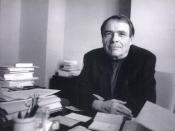The truth is a basis by which we should base our lives. Both Bourdieu and Plato, two great philosophers, are simply restating a fact that should be already known by all. You can always get caught in a lie; however, you can never be tripped up by the truth. By living lives filled with truth, we can affect many other areas, such as democracy and morality, in a positive manner.
From a moral standpoint, living a life of truth is on in which there are always rewards. If one chooses to live by the truth, in turn, they will only get truthful answers. Those who live a decent moral life will also succeed in any religion they wish to partake in, which means upholding the truth similar to upholding democracy.
Democracy, and other parts connected with it need truth in order to survive. In court, people swear the truth upon a Bible before giving a statement.
When a President takes office, he also swears upon a Bible to tell the truth. In the case of elected officials, they must also tell the truth, or they run the risk of not being re-elected.
Both Bourdieu and Plato agree that the truth is lurking out in the world. By self-education, Bourdieu claims that the truth can be discovered, and television should aid in this search. Using reasoning and philosophy, Plato states, one can find the truth that is present in us all, deep down inside.
In both Pierre Bourdieu's On Television, and select readings from Plato, a certain chain of events can be discerned. Both of these sequences end with both things connected to having bad effects on both morality and democracy. From this, we can then conclude about some of the ramifications of their work on our lives today.



Philosophy
This article does not cite material, through research of Bourdieu's writing, there appears to be nothing. Where did this writer get sources?
0 out of 0 people found this comment useful.